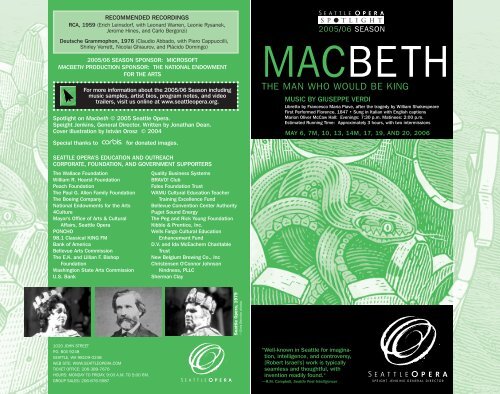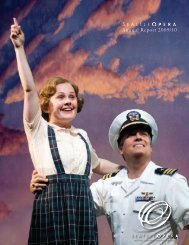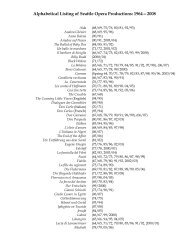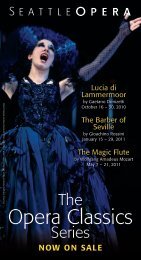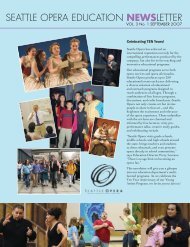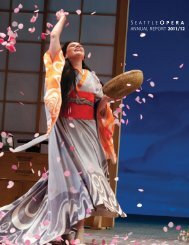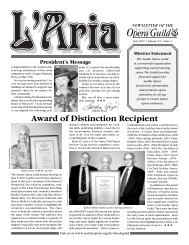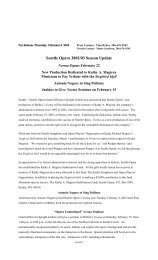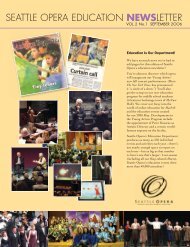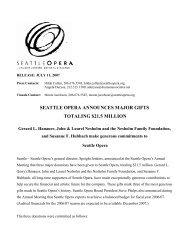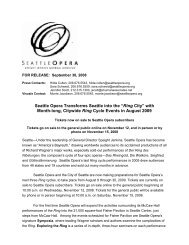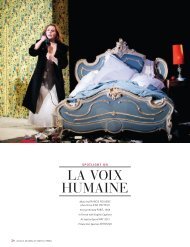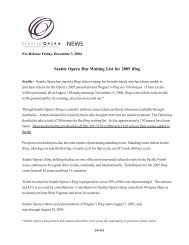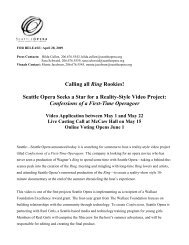THE MAN WHO WOULD BE KING - Seattle Opera
THE MAN WHO WOULD BE KING - Seattle Opera
THE MAN WHO WOULD BE KING - Seattle Opera
You also want an ePaper? Increase the reach of your titles
YUMPU automatically turns print PDFs into web optimized ePapers that Google loves.
RECOMMENDED RECORDINGS<br />
RCA, 1959 (Erich Leinsdorf, with Leonard Warren, Leonie Rysanek,<br />
Jerome Hines, and Carlo Bergonzi)<br />
Deutsche Grammophon, 1976 (Claudio Abbado, with Piero Cappuccilli,<br />
Shirley Verrett, Nicolai Ghiaurov, and Plácido Domingo)<br />
2005/06 SEASON SPONSOR: MICROSOFT<br />
MAC<strong>BE</strong>TH PRODUCTION SPONSOR: <strong>THE</strong> NATIONAL ENDOWMENT<br />
FOR <strong>THE</strong> ARTS<br />
For more information about the 2005/06 Season including<br />
music samples, artist bios, program notes, and video<br />
trailers, visit us online at www.seattleopera.org.<br />
Spotlight on Macbeth © 2005 <strong>Seattle</strong> <strong>Opera</strong>.<br />
Speight Jenkins, General Director. Written by Jonathan Dean.<br />
Cover illustration by Istvàn Orosz © 2004<br />
Special thanks to for donated images.<br />
2005/06 SEASON<br />
MAC<strong>BE</strong>TH<br />
<strong>THE</strong> <strong>MAN</strong> <strong>WHO</strong> <strong>WOULD</strong> <strong>BE</strong> <strong>KING</strong><br />
MUSIC BY GIUSEPPE VERDI<br />
Libretto by Francesco Maria Piave, after the tragedy by William Shakespeare<br />
First Performed Florence, 1847 • Sung in Italian with English captions<br />
Marion Oliver McCaw Hall: Evenings: 7:30 p.m. Matinees: 2:00 p.m.<br />
Estimated Running Time: Approximately 3 hours, with two intermissions<br />
MAY 6, 7M, 10, 13, 14M, 17, 19, AND 20, 2006<br />
SEATTLE OPERA’S EDUCATION AND OUTREACH<br />
CORPORATE, FOUNDATION, AND GOVERNMENT SUPPORTERS<br />
The Wallace Foundation<br />
William R. Hearst Foundation<br />
Peach Foundation<br />
The Paul G. Allen Family Foundation<br />
The Boeing Company<br />
National Endowments for the Arts<br />
4Culture<br />
Mayor's Office of Arts & Cultural<br />
Affairs, <strong>Seattle</strong> <strong>Opera</strong><br />
PONCHO<br />
98.1 Classical <strong>KING</strong> FM<br />
Bank of America<br />
Bellevue Arts Commission<br />
The E.K. and Lillian F. Bishop<br />
Foundation<br />
Washington State Arts Commission<br />
U.S. Bank<br />
Quality Business Systems<br />
BRAVO! Club<br />
Fales Foundation Trust<br />
WAMU Cultural Education Teacher<br />
Training Excellence Fund<br />
Bellevue Convention Center Authority<br />
Puget Sound Energy<br />
The Peg and Rick Young Foundation<br />
Kibble & Prentice, Inc.<br />
Wells Fargo Cultural Education<br />
Enhancement Fund<br />
D.V. and Ida McEachern Charitable<br />
Trust<br />
New Belgium Brewing Co., Inc<br />
Christensen O'Connor Johnson<br />
Kindness, PLLC<br />
Sherman Clay<br />
<strong>Seattle</strong> <strong>Opera</strong>, 1979<br />
—Chris Bennion photos<br />
1020 JOHN STREET<br />
P.O. BOX 9248<br />
SEATTLE, WA 98109-0248<br />
WEB SITE: WWW.SEATTLEOPERA.COM<br />
TICKET OFFICE: 206-389-7676<br />
HOURS: MONDAY TO FRIDAY, 9:00 A.M. TO 5:00 P.M.<br />
GROUP SALES: 206-676-5587<br />
“Well-known in <strong>Seattle</strong> for imagination,<br />
intelligence, and controversy,<br />
[Robert Israel's] work is typically<br />
seamless and thoughtful, with<br />
invention readily found.”<br />
—R.M. Campbell, <strong>Seattle</strong> Post-Intelligencer
MAC<strong>BE</strong>TH<br />
<strong>THE</strong> <strong>MAN</strong> <strong>WHO</strong> <strong>WOULD</strong> <strong>BE</strong> <strong>KING</strong><br />
LONG STORY SHORT…<br />
The classic tale of Scotland’s most famous royal couple, chronicling their bloody<br />
rise to power and their descent into madness and defeat.<br />
<strong>WHO</strong>’S <strong>WHO</strong>?<br />
MAC<strong>BE</strong>TH is an ambitious Scottish nobleman,<br />
Thane of Glamis, at the beginning of the opera.<br />
He will become Thane of Cawdor and King of<br />
Scotland—for a little while, at least.<br />
LADY MAC<strong>BE</strong>TH, one of literature’s greatest<br />
sleepwalkers, is a very scary<br />
woman.<br />
DUNCAN is King of Scotland at the<br />
beginning of the opera. He does not<br />
sing.<br />
MALCOLM is Duncan’s son.<br />
BANQUO, another Scottish nobleman,<br />
is a friend of Macbeth.<br />
FLEANCE is Banquo’s son.<br />
MACDUFF, the Thane of Fife, is a<br />
loving husband and father. He was<br />
“from his mother’s womb untimely ripp’d”—that<br />
is, born by Caesarian section.<br />
<strong>THE</strong> WITCHES make prophecies that always<br />
come true.<br />
WHERE AND WHEN?<br />
Scotland, 1040 A.D. and the years that followed.<br />
“[Life] is a tale told by an idiot, full of sound and fury,<br />
signifying nothing.” —Macbeth, Act Four<br />
WHAT’S GOING ON?<br />
Crossing a blasted heath after a violent battle, Macbeth and Banquo<br />
encounter a group of old hags, who give them some unsolicited information<br />
about their futures: Macbeth, currently Thane of Glamis, will become Thane<br />
of Cawdor and then King of Scotland. As for Banquo, although he will never<br />
be king, his descendants will. The witches disappear, and a messenger<br />
immediately announces that King Duncan has just promoted Macbeth to<br />
Thane of Cawdor. Macbeth immediately begins wondering about the other<br />
part of the prophecy.<br />
Shortly afterwards, Duncan and his court are staying the night at<br />
Macbeth’s castle. Egged on by Lady Macbeth, whom he has told about the<br />
witches, Macbeth murders Duncan. Duncan’s son Malcolm, fearing for his<br />
own life, flees to England, and Macbeth becomes King of Scotland.<br />
The Macbeths have no children, and Macbeth is tormented by the thought<br />
that Banquo’s descendants will someday rule Scotland. So he dispatches<br />
murderers to kill Banquo and Fleance; yet Fleance escapes, and at a feast that<br />
evening Macbeth is terrified by Banquo’s ghost, which only he can see. Although<br />
Lady Macbeth does her best to cover for her husband’s bizarre<br />
behavior, many of the guests grow suspicious.<br />
Increasingly tormented by growing insecurity, Macbeth<br />
again visits the witches, hoping for more information. They<br />
make three new prophecies: he is to fear Macduff; no man<br />
born of woman can harm him; and he need have no<br />
fear until the forest of Birnam<br />
comes to Dunsinane castle. When<br />
Macbeth asks about Banquo’s heirs,<br />
they show him a vision of Banquo’s<br />
descendants—each wearing a crown, their<br />
line stretching on “to the crack of doom.”<br />
Macbeth immediately takes steps to have<br />
Macduff killed; his soldiers butcher the Thane<br />
of Fife’s wife and children, but Macduff himself<br />
(along with many others) has already joined<br />
Malcolm in England. Their army will lay siege to<br />
2 | VISIT WWW.SEATTLEOPERA.ORG FOR SEASON UPDATES MAC<strong>BE</strong>TH | 3
“Shakespeare is one of<br />
my very special poets,<br />
and I have had him in<br />
my hands from my earliest<br />
youth, and I read and reread<br />
him continually.”<br />
—Giuseppe Verdi From Verdi: A Biography,<br />
Mary Jane Phillips-Matz;<br />
Oxford University Press, 1993<br />
SHAKESPEARE’S “SCOTTISH PLAY”<br />
Macbeth at Dunsinane castle, which they<br />
approach from the direction of Birnam<br />
Wood, concealing themselves behind tall<br />
branches. Lady Macbeth, whose guilt has<br />
driven her to sleepwalking and nightmares,<br />
dies, and Macduff—who reveals<br />
that he was not born of woman—kills<br />
Macbeth. Malcolm is crowned king.<br />
Macbeth is one of Shakespeare’s briefest, bloodiest, and most popular plays. The Bard<br />
wrote other plays starring murderous usurpers, but Macbeth is unique in the way it<br />
incriminates the audience in the crime. When the story begins, Macbeth seems like such<br />
a nice, normal guy. He’s strong, brave, and ambitious; his poetry is eloquent and beautiful,<br />
yet clear and sensible; and he and his wife have one of the best marriages in all<br />
Shakespeare (truth to be told, there’s not much competition). Shakespeare is careful to<br />
make all the other characters nondescript, or annoying, so that our sympathies rest entirely<br />
with this “butcher and his fiend-like queen.”<br />
It’s a play about the evil lying dormant in each of us, and about ambition—and also<br />
about fear. Macbeth may be brave, but much of the time he is reacting to crippling<br />
fears—fear of the witches, fear of his wife, fear of his enemies, and, most of all, fear of<br />
himself and the foul deeds he is capable of committing. Lady Macbeth, who is chiding<br />
her husband for his timidity when she first<br />
appears, will unravel completely into a neurotic<br />
mess of fear and guilt. Perhaps<br />
because of its all-pervading black magic<br />
and sense of fear, Macbeth has given rise<br />
to various superstitions. The play is said to<br />
be cursed, and it is considered bad luck to<br />
say the name of this play inside a theater.<br />
(For that reason, it’s often called “the<br />
Scottish play.”)<br />
Leonie Rysanek, who made history at the<br />
Metropolitan <strong>Opera</strong> singing Lady Macbeth<br />
—Metropolitan <strong>Opera</strong> Archives<br />
Classified among Shakespeare’s “high<br />
tragedies” (the others being Hamlet,<br />
Othello, and King Lear) Macbeth was<br />
evidently written in the later part of Shakespeare’s career. In 1603 Queen<br />
Elizabeth died, leaving no heir; the throne of England passed to her<br />
nephew, King James VI of Scotland, who became James I of England<br />
(known for sponsoring the “King James” translation of the Bible). Historians<br />
have suggested that Macbeth was written specifically with James in mind:<br />
James was Scottish, obsessed with witches (especially keen on burning<br />
them), and traced his lineage back to the historical Banquo. It is rumored<br />
that the scene in which Banquo’s descendants appear in a vision before<br />
Macbeth originally featured an actor holding a mirror up to King James,<br />
sitting there in the first audience.<br />
ABOUT <strong>THE</strong> COMPOSER<br />
The greatest Italian composer of opera,<br />
Giuseppe Francesco Fortunino Verdi, was<br />
also a landowner and farmer; a philanthropist;<br />
an impossible, pessimistic, grumpy old<br />
stick-in-the-mud; and one of the founding<br />
fathers of the Italian nation. At the beginning<br />
of his life, Verdi was a simple peasant boy,<br />
the son of a humble country innkeeper,<br />
watching Napoleon’s troops flee the fields of<br />
northern Italy. At his funeral, 88 years later,<br />
300,000 people burst into song in the<br />
streets of Milan as the coffin of this grand old<br />
Giuseppe Verdi<br />
man of Italian opera approached<br />
its final resting place. Verdi’s music became the life and breath of a new nation<br />
and is still acknowledged by many to be the crowning achievement of a<br />
venerable and glorious art form.<br />
Verdi was born in 1813, in a tiny hamlet named Le Roncole, south of<br />
Parma. In those days, the peninsula of Italy was divided into many little<br />
kingdoms, all ruled from afar as part of the vast Austro-Hungarian Empire.<br />
In fact, Verdi was only a baby during the Napoleonic campaigns, during which<br />
Parma passed back and forth between France and Austria. One of Verdi’s<br />
earliest childhood memories was hiding in a church bell-tower with his<br />
mother while their town was being invaded by French troops.<br />
4 | VISIT WWW.SEATTLEOPERA.ORG FOR SEASON UPDATES MAC<strong>BE</strong>TH | 5
Verdi’s music became the life<br />
and breath of a new nation<br />
and is still acknowledged by<br />
many to be the crowning<br />
achievement of a venerable<br />
and glorious art form.<br />
The young man showed musical<br />
talent at an early age. So Antonio<br />
Barezzi, a wealthy grocer from the<br />
nearby town of Busseto, took<br />
Verdi under his wing and paid for<br />
his schooling and music lessons.<br />
As a teenager, Verdi wrote for and<br />
conducted the Busseto Municipal Orchestra (not one of Italy’s leading musical groups!)<br />
and played the organ in church every Sunday in Le Roncole. When he had absorbed<br />
everything Busseto had to offer, Verdi married Barezzi’s daughter Margherita and moved<br />
to Milan, the opera capital of the world, to continue his studies and try his hand at writing<br />
an opera. His first opera was a success. But Verdi’s son, daughter, and finally his wife all<br />
died while he was working on his second opera, a comedy which (understandably)<br />
flopped. The composer sank into a black depression from which he never really emerged.<br />
He swore he would never write another note and lost interest in everything.<br />
The general director of La Scala, the opera house in Milan, convinced Verdi to try his<br />
hand at a third opera, and in 1842 Verdi wrote Nabucco, the story of an arrogant<br />
Babylonian king who oppresses the captive nation of Israel. The audience at<br />
the premiere went berserk and Verdi became a celebrity overnight. To this<br />
day, all Italians can sing the familiar “Va, pensiero” chorus from Nabucco,<br />
which became the anthem of the struggle for Italian independence from<br />
Austria. The success of this opera catapulted Verdi back into the composer’s<br />
seat. For the next 10 years, he roamed around Italy and Europe, pouring out<br />
a string of about 20 operas. These operas are all improbable stories of wild<br />
passion set to vigorous and thrilling music. Almost all of them feature sympathetic<br />
nationalists toiling under foreign domination, and Italian audiences, still<br />
languishing under Austrian rule, readily identified with the characters and<br />
passions in Verdi’s early operas. Over the years, Verdi became very good at<br />
outwitting government censors who objected to his presenting certain kinds<br />
of situations (chiefly the murder of kings) onstage.<br />
At the end of his years “in the galleys,” as Verdi once called them, the<br />
37-year-old composer bought a farm near Busseto and moved there with<br />
Giuseppina Strepponi, a former opera singer whose voice had been ruined.<br />
The Verdi-Strepponi relationship (not a marriage) horrified the conservative<br />
Bussetans, especially if—as one biographer has suggested—the artistic couple<br />
gave a child up for adoption. (Strepponi had previously done so with several.)<br />
Verdi even ended up disowning his own parents and kicking them out of his<br />
house. As his family life was (for the second time) embroiled in catastrophe,<br />
Verdi penned three of the greatest operas of all time, all of which scrutinize<br />
tormented relationships between parents and children: Rigoletto, Il trovatore,<br />
and La traviata.<br />
Verdi lived near Busseto in his villa, called Sant’Agata, for the rest of his life,<br />
though he made frequent trips to Milan, Rome, Venice, Genoa (his favorite city<br />
in Italy), Paris, and places further abroad to oversee premieres of his operas.<br />
In 1861, he wrote the opera La forza del destino (The Force of Destiny) for St.<br />
Petersburg and spent two winters in Russia preparing the first performance.<br />
One of his greatest operas, Aida—set in ancient Egypt—received its world<br />
premiere in Cairo, not long after the opening of the Suez Canal.<br />
Interior view of Teatro alla Scala in Milan<br />
—©Archivo Iconografico, S.A./CORBIS<br />
When Italy finally united itself as a nation under King Victor Emmanuel II,<br />
Verdi was one of the first members of the Italian parliament. He demonstrated<br />
his patriotism again by writing a magnificent Requiem in honor of the important<br />
Italian novelist and patriot Alessandro Manzoni.<br />
6 | VISIT WWW.SEATTLEOPERA.ORG FOR SEASON UPDATES MAC<strong>BE</strong>TH | 7
In his last 20 years, Verdi spent much of his time working on his farm. He also founded<br />
a retirement home for musicians in downtown Milan; to this day, former opera singers and<br />
instrumentalists fill its halls. Verdi wrote only one opera in the 1880s and one in the 1890s:<br />
Otello and Falstaff, his greatest operas and the respective pinnacles of Italian tragic and<br />
comic opera.<br />
ITALIAN <strong>BE</strong>L CANTO OPERA<br />
When Giuseppe Verdi wrote Macbeth in 1847, he was a hot-shot young composer about<br />
to reinvent the moribund tradition of Italian opera. Pioneered during the Renaissance, Italian<br />
opera had by the 1840s become more a form of entertainment than an art form. While<br />
plenty of operas were being written and performed, few of them had much lasting value.<br />
Verdi, who came from humble origins, first achieved fame and fortune by writing a series<br />
of operas in the bel canto style so popular at the time—only his were more exciting,<br />
featuring a new intensity in the music. In Macbeth, his tenth opera, he began setting<br />
out in a new direction.<br />
[Verdi] first achieved fame and<br />
fortune by writing a series of<br />
operas in the bel canto style<br />
so popular at the time—only<br />
his were more exciting,<br />
featuring a new intensity<br />
in the music.<br />
But Macbeth is still a bel<br />
canto opera. The name means<br />
“beautiful singing,” since in this<br />
period opera was all about the<br />
singing. (Other kinds of opera,<br />
from other historical periods,<br />
have been more about the story,<br />
or the poetry, or the orchestra,<br />
or the scenic spectacle, or the ballet, or any of the other art forms that combine to form<br />
opera.) Every bel canto opera featured roles for three kinds of singers: primarii, or leads,<br />
who expected at least one solo aria; comprimarii, or supporting characters, who expected<br />
to sing a few lines of dialogue and their own musical line in ensembles; and chorus, who<br />
sing and move as a group. Since all these singers were on the staff of every opera house<br />
in Italy, every bel canto opera had to feature roles for all of them. Macbeth features four<br />
primarii (Macbeth, Lady Macbeth, Banquo, and Macduff), several comprimarii, and<br />
choruses of witches, assassins, and Scottish nobility.<br />
Writing a bel canto opera was a little like pouring your setting and storyline into a preset<br />
mould. Most of these operas feature standard musical forms: the rousing opening<br />
chorus, the requisite brindisi or “Drinking Song” (in which all the characters hold glasses<br />
and sing about the pleasures of alcohol), the obligatory concertante (in which nothing<br />
happens for several minutes while everyone in the cast sings simultaneously about how<br />
surprised they all are). You will<br />
notice each of these numbers in<br />
Macbeth. In this kind of opera,<br />
the plot unfolds quickly in<br />
declamatory music, known as<br />
recitative, so that we spend<br />
most of our time listening to the<br />
arias and ensembles in which<br />
the singers explore their characters’<br />
emotions. Each aria or<br />
ensemble follows a standard<br />
musical form, featuring a slow<br />
movement followed by a fast<br />
movement. And usually each<br />
piece begins with a catchy tune<br />
that most of us could sing or<br />
hum, and develops into elaborate,<br />
showy music in which the<br />
singer shows off his or her skill<br />
and wows us with “beautiful<br />
singing”—the bel canto that<br />
it’s all about.<br />
ADAPTING SHAKESPEARE<br />
Woodcut book illustration, witches at<br />
cauldron<br />
—©Bettmann./CORBIS<br />
Shakespeare is the greatest writer in the English language; his words, 400<br />
years later, are still studied, memorized, and adored wherever English is spoken.<br />
And yet his stories, separated from the language he used to tell them,<br />
have a life of their own. His plays have been translated into almost every<br />
other language, and the<br />
“This Macbeth is dearer to<br />
number of Shakespeare<br />
me than all my other<br />
adaptations in other art<br />
operas.”<br />
forms—operas, ballets,<br />
—Giuseppe Verdi<br />
musicals, movies, paintings—is<br />
beyond count. Few adaptations of Shakespeare come close to matching<br />
(let alone exhausting) the richness of the original; but as long as the originals<br />
are around to inspire new artists, the flood tide of adaptations will never let up.<br />
8 | VISIT WWW.SEATTLEOPERA.ORG FOR SEASON UPDATES MAC<strong>BE</strong>TH | 9
Films of Macbeth<br />
To this day, Shakespeare’s<br />
Macbeth is constantly being<br />
performed on stages all over<br />
the world. But this evocative<br />
story of murder and insanity<br />
has also inspired several great<br />
filmmakers. Akira Kurosawa set<br />
Macbeth in the Samurai period<br />
of Renaissance Japan in his<br />
1957 film Throne of Blood,<br />
starring Toshiro Mifune and the<br />
Shakespeare was Giuseppe Verdi’s favorite<br />
author, even though Verdi didn’t speak English.<br />
The first complete Italian translation of Shakespeare<br />
came out when Verdi was a young man; he knew<br />
the translator, and kept the book with him for the<br />
rest of his life. In fact, when Verdi traveled he liked<br />
to have a Bible and a complete Shakespeare<br />
placed next to his bed. Verdi’s favorite play was<br />
King Lear, and throughout his life he made several<br />
attempts to turn it into an opera. His final two<br />
operas, Otello and Falstaff, are perhaps the only<br />
Shakespeare adaptations worthy of the originals.<br />
terrifying Isuzu Yamada. In place<br />
Shakespeare was a popular source for composers<br />
of Shakespeare’s poetry,<br />
<strong>Seattle</strong> <strong>Opera</strong>, 1979<br />
Chris Bennion photo<br />
of Italian opera. The generation preceding Verdi<br />
Kurosawa uses visuals from<br />
produced two bel canto operas based on<br />
musical tinta matches the poetic tinta of Shakespeare’s play, which<br />
Japanese noh drama—a<br />
Shakespeare, Rossini’s Otello and Bellini’s<br />
obsesses over images of blood and horror, and delights in such paradoxes<br />
tradition older than either<br />
Capuleti ed i Montecchi. But both of these operas<br />
as “Fair is foul and foul is fair.” Inspired by his favorite dramatist, Verdi<br />
Shakespeare or Italian opera.<br />
In 1971, Playboy Productions<br />
released director Roman<br />
Polanski’s Macbeth, a muddy,<br />
bloody spectacle starring Jon<br />
Finch and Francesca Annis,<br />
are more bel canto than they are Shakespeare.<br />
In Macbeth—Verdi’s first Shakespeare opera—<br />
Verdi discovered that the more you ignore the rules<br />
of bel canto and take your cues from Shakespeare,<br />
the more thrilling and dramatic your opera.<br />
would go on to create a tinta, a unique sound-world, for each of his<br />
remaining operas.<br />
Verdi, who was obsessed with King Lear, also found powerful personal<br />
resonances in the story of Macbeth. Politically, Verdi was committed to<br />
the cause of Italian independence from Austria, and in each of his early<br />
which matches Shakespeare’s<br />
operas he managed to sneak in some political propaganda. In Macbeth,<br />
From the first bars of the<br />
grim poetry with grim visual<br />
he writes a mournful chorus for those who have fled Macbeth’s reign of<br />
images. And check out the overture to Macbeth, its<br />
terror, “Patria oppressa!” The anti-tyranny message comes through loud<br />
lighter-weight Scotland, PA, music is unmistakeable:<br />
and clear, as does Verdi’s compassion for the suffering exiles. One of the<br />
released in 2001 and starring unsettling, eerie, and weird.<br />
most moving scenes in Shakespeare’s play comes when Macduff learns<br />
James LeGros and Maura<br />
In particular, Macbeth is Verdi’s first opera to<br />
that his wife and children have been slaughtered. Verdi, who had lost his<br />
Tierney as a murderous couple<br />
have what the composer called a tinta—an allpervasive<br />
musical color. The idea that an opera’s<br />
Macduff a heart-rending tenor aria at this point, “Ah, la paterna mano.”<br />
own baby son and daughter several years before writing the opera, gives<br />
in a fast-food joint in the 1970s.<br />
It’s also possible to find a<br />
music should have an organic unity was new;<br />
And in his music for Macbeth and Lady Macbeth, like all his music for<br />
televised stage production of<br />
previous bel canto operas all sound similar to each<br />
baritone and soprano, Verdi is working out his own complicated relationship<br />
Macbeth from Stratford in 1976,<br />
directed by Trevor Nunn and<br />
starring the incomparable Ian<br />
McKellen and Judi Dench.<br />
other, which made it easy to cut and paste arias<br />
and ensembles from opera to opera. But from the<br />
first bars of the overture to Macbeth, its music is<br />
unmistakeable: unsettling, eerie, and weird. The<br />
with Giuseppina Strepponi.<br />
Listen to music clips from MAC<strong>BE</strong>TH online at www.seattleopera.org.<br />
10 | VISIT WWW.SEATTLEOPERA.ORG FOR SEASON UPDATES MAC<strong>BE</strong>TH | 11


